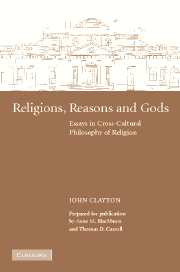Book contents
- Frontmatter
- Contents
- Editorial preface
- Acknowledgments
- List of abbreviations
- 1 Claims, contexts and contestability
- PART I REASON AND RELIGIOUS PLURALISM
- 2 Thomas Jefferson and the study of religion
- 3 Common ground and defensible difference
- 4 Religions, reasons and gods
- PART II THEISTIC ARGUMENTS IN PRE-MODERN CONTEXTS
- PART III THEISTIC ARGUMENTS IN EARLY-MODERN CONTEXTS
- Appendix: The 1997 Hulsean Sermon
- Bibliography
- Index
3 - Common ground and defensible difference
Published online by Cambridge University Press: 22 September 2009
- Frontmatter
- Contents
- Editorial preface
- Acknowledgments
- List of abbreviations
- 1 Claims, contexts and contestability
- PART I REASON AND RELIGIOUS PLURALISM
- 2 Thomas Jefferson and the study of religion
- 3 Common ground and defensible difference
- 4 Religions, reasons and gods
- PART II THEISTIC ARGUMENTS IN PRE-MODERN CONTEXTS
- PART III THEISTIC ARGUMENTS IN EARLY-MODERN CONTEXTS
- Appendix: The 1997 Hulsean Sermon
- Bibliography
- Index
Summary
The vigour with which radically conservative religious movements have gained ground around the world – East and West, North and South – caught the liberal intellectual establishment unprepared. Many consoled themselves at first by insisting that it was a temporary blip and predicted that the corrective forces of secularization would soon reassert themselves and set things back on course in and beyond the West. However, this has not happened. In the mean time, the liberal community has gone on the offensive, warning with uncharacteristic sensationalism against domestic culture wars or global clashes of civilizations if commonality is not maximized. Rawlsians may have soberly realized that citizens of modern democratic societies share less in common than they had once imagined, but they have not abandoned the strategy of seeking out and expanding the possible patches of overlapping consensus that may survive. This typifies the intuitive response of liberalism, both classical and contemporary, to diversity: privatize difference and cultivate common ground as a means of containing the potentially destructive social effects of cultural, especially religious, diversity.
Who indeed could doubt that staking out and tending common ground is the first thing required to overcome difference and to create a common good? Where there are differences of opinion between persons or states or religions, most of us instinctively look to strategies that maximize common ground. The image of common ground evokes public parks and village greens. It is an image full of warmth and reassurance, exuding a sense of community and well being.
- Type
- Chapter
- Information
- Religions, Reasons and GodsEssays in Cross-cultural Philosophy of Religion, pp. 58 - 79Publisher: Cambridge University PressPrint publication year: 2006



